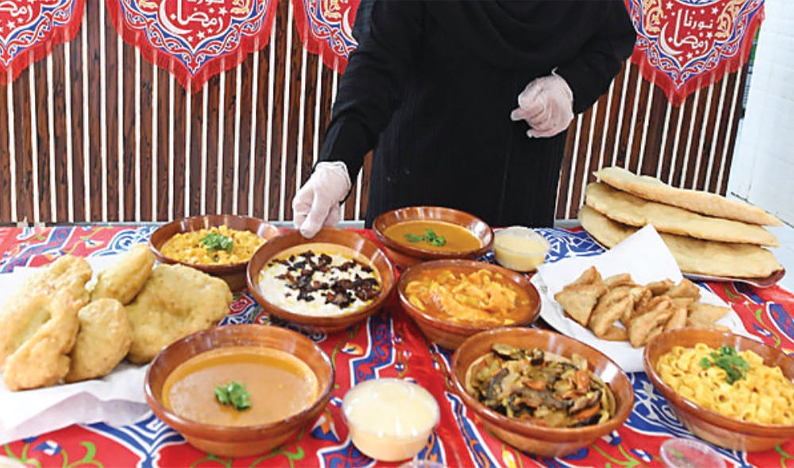RIYADH: Ramadan unites everyone regardless of ethnicity, and Muslims around the Kingdom gather to break their fasts with diverse dishes that celebrate and highlight their cultural traditions during the holy month. Here’s a look at how expats from different cultures living in Saudi Arabia celebrate iftar and break their fasts during Ramadan.
Some expats who have lived in the Kingdom for years and call the country their home have held onto their cultural traditions, strengthened them, and passed them from one generation to the next.

Many expats living in the Kingdom enjoy the traditional Saudi iftar dishes alongside their cultural staples. (SPA)
“I think food is one particular thing that keeps one connected to their home or roots in a way. It’s nostalgic for us too when we break our fast in a home away from home,” Arshin Fathima, who has called Saudi Arabia her home for the past 12 years, told Arab News. “I’m from Chennai (the southern part of India). India is a country with diverse cultures and because of that each city has its own distinctive cuisine exclusive to the month of Ramadan.
She added: “I think when you start your family in another country, definitely the kids get accustomed to the environment and adapt themselves more comfortably here . . . so in a way sticking to our traditional meals makes us feel at home too sometimes.”
Fathima told Arab News that a traditional iftar table in her home contains a porridge or soup called ganji that is made with rice and lentils and very light spices. “We also have crispy and soft fritters called medu vada made from lentils. Both are a good coolant and are light on the stomach after a long day of fasting. Of course, there are other items too, but without ganji and medu vada I think any Chennaiites’ fast would be incomplete,” she said.
When asked if there were any similarities between her meals and a traditional Saudi iftar table, Fathima enthusiastically said: “Yes! This is like my second home. We have cheese and meat sambousek, kunafa, logaimat alongside our traditional porridge. Sambousaks have to be the first thing my kids reach for when they break their fast.”
Dr. Kifaya Ifthikar, who is from Sri Lanka, has been living in Saudi Arabia for more than 22 years. “An iftar table should look like a balance between health and happiness,” she said.
Ifthikar added: “In Sri Lankan cuisine, it’s usually savory all the way, we consume an assortment of fritters called cutlets, rolls or patties and a thirst-quenching pink drink called falooda.”

Falooda is a drink traditionally consisting of rose sherbet syrup, milk, basil seed and occasionally vermiculite noodles.
In contrast to Saudi and Chennai iftar, Ifthikar said that a Sri Lankan iftar must always consist of a spicy porridge dish. Iftikhar explained that “even though our dishes are quite different, we do see some similarities, for example, cutlets could be easily substituted with falafel or our porridge with oatmeal soup. Dates are always a staple, and occasionally a sip of qahwa.”
Many Muslim expats living and working in the Kingdom have adopted the traditional Saudi style of breaking their fast with soups, light fried dishes and sweets, and the classic Vimto and dates.
“As an American convert to Islam living in Saudi Arabia, I’ve really started to fall in love with Saudi food,” Hana Nemec, a US citizen and head of communications for the American Chamber of Commerce, told Arab News.

Many expats living in the Kingdom enjoy the traditional Saudi iftar dishes alongside their cultural staples. (SPA)
“American food just doesn’t feel like iftar food to me. Iftar foods are so special for each of us because they’re our first moment of thankfulness for the reprieve from our fast,” Nemec said.
Apart from having a Saudi-style iftar table, Nemec has also tried her hand at cooking local dishes. “After it being my favorite food for the last six years, I tried my own jareesh recipe last year and my friends couldn’t believe it was made by a non-Saudi,” she said.
Nemec isn’t the only American living in Saudi Arabia who has embraced and adopted the local traditional iftar.
Hasan Yusuf, an American Muslim living and working in Saudi Arabia, said that his favorite way to break his fast is through a shared meal with locals over a joint dish of earika and haneeth — and relishing it by eating hands. He explained that food brings people together. “We feast intimately, sharing from one plate. Dishes like earika and haneeth must be eaten from one bowl or plate. Everyone’s hands are digging in, reaching for the stars and eating joyfully,” he said.
Yusuf said that he has grown to appreciate a local favorite, camel’s milk, which he constantly incorporates in his iftar.
“It’s just as simple as saying: “You are my brother, we are family, say bismillah and enjoy ‘our’ cultural dish. The ‘our’ part makes me feel included. Never have I felt that eating earika or haneeth is an exclusive thing. In fact, I’ve mastered making it now. So, yes, this year I’ll be inviting them to try OUR earika,” Yusuf said.
Iftar connects Muslims during the holy of Ramadan, regardless of what dishes are on the table or what spices are used. Muslims across the Kingdom embrace their cultural diversity. “They remind us of how blessed we are to have the sustenance God has granted us, and for his mercy and generosity reflected in our lives to be able to gather with those that we love to consume it. Not everyone on Earth is as blessed as us, so these foods are meant to be cherished,” Nemec said.
Although the food on each of our iftar tables may vary in colors and flavors, Muslims in Saudi Arabia are united in the celebration of Ramadan.














